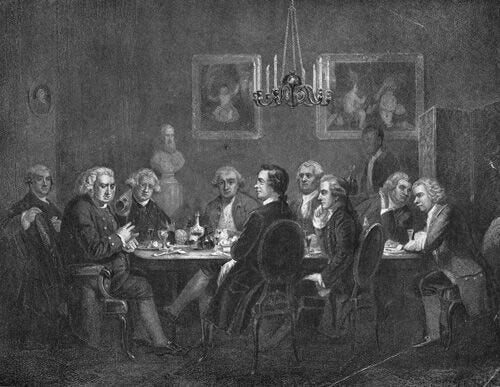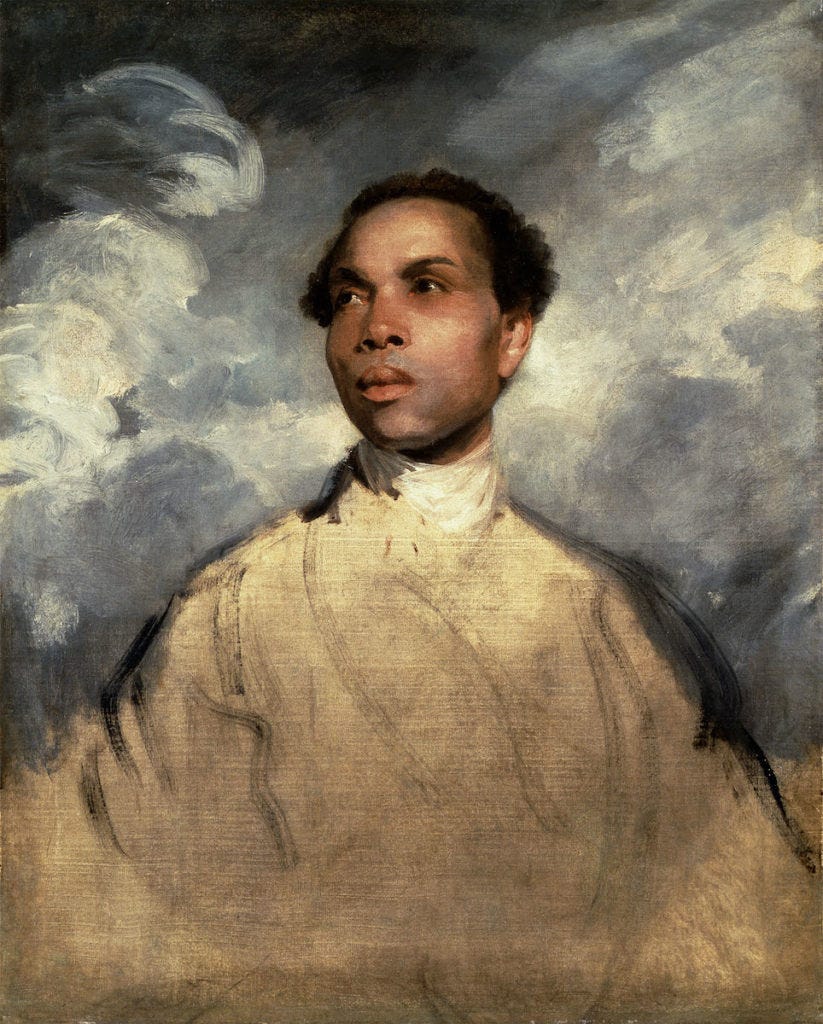We do not know very much about Francis Barber, Samuel Johnson’s servant — even the portrait we have of him is probably of someone else — but what we do know is well-contained and contextualised in The Fortunes of Francis Barber by Michael Bundock, a book so clear and concise it must count as one of the better Johnson books of recent years. Bundock is a barrister, as well as a research fellow at UCL. There are many sections on the uncertain law about the status of slaves in England, such as the famous Somerset judgement about the right of an owner to deport a slave from England, that are unlikely to be written more clearly or engagingly. It is full of information and highly readable. It would be a marvellous gift for anyone with an interest in the period. And it was recently reissued in paperback.
Frank Barber, as Johnson called him, was born a slave in Jamaica in the 1740s. There was about one slave per acre in Jamaica at that time. A combination of low birth rates and high infant mortality meant the only way to maintain labour supply was to import slaves. Between 1607 and 1857, Britain brought 1,020,000 African slaves to Jamaica. In 1730 there were about 75,000 enslaved people on the island.
We don’t know much about Frank’s owner, but another man on the island punished slaves who ate the sugar canes by having other slaves piss and shit in their mouths. Slaves were routinely whipped. Salt and lime juice was rubbed into their wounds. The women were regularly raped. Young Frank was born into a miserable, hopeless world. At this time, his name was Quashy.
The usual life stages for a slave child were to start helping pick up trash aged 3, to go out weeding aged 5 or 6, to heap manure into cane holes aged 12, and by 18 to be a labourer planting and harvesting, twelve hours a day, six days a week, in the dreadful heat. On the seventh day, you worked your own plot of land. But Quashy did not work outside. He was a house slave, a lucky position in relative terms.
It seems possible that the master, Colonel Bathurst, was Quashy’s father, which is why, in 1750, when he was about seven, Quashy sailed to England. Bathurst had Quashy Christened and later freed him in his will, leaving him twelve pounds. In London, Quashy would have been part of the growing population of black people. (About 1% of London was black at this time.) When he was sent to school in Yorkshire for two years, however, he was likely the only black person.
Frank came back to London and lived with the Colonel’s son, a good friend of Samuel Johnson, which is how he ended up being apprenticed to the great man. This was a piece of luck. Johnson seems to have shared some of the racial prejudice of his time, as Burdock relates, but was a vastly more kind and tolerant person than many others, with deeply held convictions against slavery. Their relationship was a little rocky to start with, but Johnson ended up making Frank the main beneficiary of his will.
We don’t know when Johnson started paying Frank, but it was at least from the age of twenty-four. And Johnson housed, fed, and clothed him also. Because of a lack of records, and the inherent uncertainty of the legal position, we don’t know when Barber stopped being a slave. But he definitely wasn’t treated as a slave by Johnson. There was a fashion for black slaves in London as they were a status symbol. Johnson was more concerned with the tending of Frank’s soul, something he would talk to him about for the next thirty years. On slavery, the important question is how Frank viewed himself. When he was freed in Bathurst’s will, he left Johnson’s house, with his twelve pounds, and went to work for an apothecary.

During that time he visited Johnson and they seemed to get on well. Gough Square was full of middle-aged people who were sullen, silent, grumpy, and often not well disposed towards each other, or to Frank. But he and Johnson maintained a relationship. After two years, Frank agreed to go back to Sam. Then he changed his mind and joined the Navy. This would have paid well and been more equal, at least among the lower ranks — and somewhat more representative: the population of the navy was between 6-8% black at this time — but it came with a huge risk of dying from disease.
Johnson worried about Frank, who was often in poor health, and used his connections to have him taken out of the navy. We don’t know how Frank reacted to this interference, but Burdock does a good job of contextualising Johnson as a paterfamilias, whose influence over Barber would continue for many years. Indeed, there are excellent summaries of all sorts of aspects of life, such as newspaper adverts for runaway slaves (Johnson’s is a model of humanism, seeking to maintain a friendship rather than recall a slave), the definition of slavery, life in the Navy, and the role of apothecaries.
It wasn’t all Johnson telling Frank what to do. After a trip to Lincolnshire once, Johnson reported: ‘when we returned home together, I found that a female haymaker had followed him to London for love.’ Unlike many servants, Frank was allowed to entertain friends in Johnson’s home. There was inevitably a lot of interest about legal cases and the definition of slavery among the black community in London, with an event in a pub on Fleet Street reported in the London Chronicle where, ‘no Whites were allowed.’ Frank may have gone to such gatherings, but we do not know. Although the grounds of the Somerset judgement were narrow, it was a starting point for the idea that there could be no slavery in England. A generation later, the abolition movement would flourish. Bundock quotes Simon Schama saying Frank had a party to celebrate Somerset, but no evidence exists for such an event.
Further good treatment came from Johnson — who never allowed his servant to buckle his shoes or buy food for Hodges, his beloved cat — when he sent Frank to Bishop Stortford Grammar School. Frank was in his twenties at this time and it was now that Johnson wrote to him, like a good paterfamilias, ‘you can never be wise unless you love reading.’
In 1773, thirty-one year old Barber married a seventeen-year-old white woman called Elizabeth Ball. They would eventually have four surviving children, and a son who died. Their first child, who died, was called Samuel, as was their surviving son, a tribute to Frank’s boss. Many people were hateful about mixed race marriages and especially nasty about the resulting children. William Cobbet said such families were ‘foul, unnatural, and detestable’. Hester Thrale, Johnson’s close friend, called Elizabeth Frank’s ‘Desdemona’, with her usual haughty insensitivity. Johnson remained concerned for Frank’s well-being in the face of hostile reactions. The Barber family lived with Johnson at this time.
When Johnson died, Barber was bereft. But here he makes his silent contribution to history. The final pages of Boswell’s Life are among the best, including the account of Johnson’s death. Boswell got this passage from his brother, who had interviewed Barber and transcribed what he said. Barber and his wife were with Johnson when he died and nursed him in his final illness. It is the only eyewitness account of Johnson’s death, and Frank wrote it. There are other sections closely based on what Frank told Bozzy. So Frank Barber is, in his own small way, a biographer.
The rest of Frank’s life is a sorry tale. He inherited a £70 annuity, a very generous sum (more than double Frank and Elizabeth’s joint wages), as well as £1,500 on trust. It seems patronising to have the money held on trust, but Frank was impecunious and eventually ran out of money, despite being relatively well-off. Johnson had urged him to move to Lichfield, where he had connections, and could live more cheaply than in London, which Frank did. To start with he was a local celebrity. But he was eventually called before the magistrate to be examined under the Poor Law. It seems a combination of poor health and bad money management made life difficult. He even sold Johnson’s bible and watch to raise funds. When he was only fifty he was described in decrepit terms in the Gentleman’s Magazine:
Francis is ... low of stature, marked with the small-pox; has lost his teeth; appears aged and infirm, clean and neat, but his cloaths the worse for wear; a green coat, his late Master’s cloaths, all worn out.
Like Johnson, he set up a school to try and earn money — he may have been England’s first black school master. Like Johnson, his school failed. The schools were in neighbouring villages, although many decades apart. Frank was frequently ill and shortly after his examination for the Poor Law, he died after a painful operation, aged fifty-seven or fifty-eight, in January 1801. His descendants live near Lichfield still.
The Fortunes of Francis Barber, by Michael Bundock
Other Common Reader articles about Johnson
Charles Nicoll’s review in the LRB which has some corrective material about Jamaica at the end. ‘Bundock is splendidly informative on Barber’s life with Johnson, but tells us little about his first life in the rugged uplands south of Port Maria, on a dogleg bend of the river, a world away from those London literary gatherings which would become his habitat.’ He also disputes that Bathurst was Quashy’s father.
Thanks for reading. If you’re enjoying The Common Reader, let your interesting friends know what you think. Or leave a comment at the bottom.
If you don’t subscribe to The Common Reader, but you enjoy reading whatever’s interesting, whenever it was written, sign up now.



Thanks for this. I certainly wanted to learn more about Barber after reading Boswell's Life of Johnson. You describe this book as one of the best recent Johnson-related books. What books about Samuel Johnson would you most recommend? (Besides the Boswell, of course.) Thus far I've stuck to Johnson's own writings.
Maybe the Kardashians are distant relatives of Johnson?